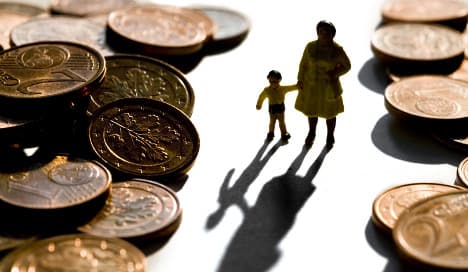Anxious middle class shrinks as gulf between rich and poor grows

A new study released on Thursday said the divide between Germany’s rich and poor continues to grow and is squeezing out the country's anxious middle class.
The German Institute for Economic Research (DIW) research showed the number of both poor and rich households growing in absolute terms – and for the last 10 years the impoverished households have become progressively poorer.
The polarising trend, studied between 2001 and 2009, means that the middle class has fallen from 64 percent to only 60 percent of German society in the past decade.
“On the one side the number of people living in luxury is growing, while on the other side the number of those who must live with low incomes, or are even poor, grows,” DIW researchers wrote.
This is creating a “status panic” within the middle class, they said.
Low incomes, according to the DIW, are those that have a take-home pay of less than 70 percent of the average net salary. For a couple with two children younger than 14, this would equal €1,800 including state parental benefits after taxes.
In 2000, some 18 percent of German households fell into this group – but jumped to 22 percent in 2009, the DIW found.
Meanwhile the wealthy – or those who take home above 150 percent more than the average income (€3,870) are multiplying. Their numbers grew from 16 to 18 percent in the same time period, though there was a slight reduction following the financial crisis.
The development is dangerous for social stability, the DIW told the paper.
“Particularly among the middle class, whose status depends on income and not assets, there is a sensitivity to developments that threaten this status,” the paper quoted, adding that this could fuel xenophobia among those looking for a scapegoat.
With this in mind, the DIW experts were highly critical of the government’s recent decision to cut spending with a record austerity package, which aims to slash €80 billion from the budget by 2014, including €11.2 billion next year, much of it from social welfare benefits.
DIW economist Jan Goebel said it was inappropriate for the “concrete suggestions of the savings package to actually only affect the lower income levels,” raising the question as to “just why the people with higher incomes mustn’t bear any of the savings.”
Comments
See Also
The German Institute for Economic Research (DIW) research showed the number of both poor and rich households growing in absolute terms – and for the last 10 years the impoverished households have become progressively poorer.
The polarising trend, studied between 2001 and 2009, means that the middle class has fallen from 64 percent to only 60 percent of German society in the past decade.
“On the one side the number of people living in luxury is growing, while on the other side the number of those who must live with low incomes, or are even poor, grows,” DIW researchers wrote.
This is creating a “status panic” within the middle class, they said.
Low incomes, according to the DIW, are those that have a take-home pay of less than 70 percent of the average net salary. For a couple with two children younger than 14, this would equal €1,800 including state parental benefits after taxes.
In 2000, some 18 percent of German households fell into this group – but jumped to 22 percent in 2009, the DIW found.
Meanwhile the wealthy – or those who take home above 150 percent more than the average income (€3,870) are multiplying. Their numbers grew from 16 to 18 percent in the same time period, though there was a slight reduction following the financial crisis.
The development is dangerous for social stability, the DIW told the paper.
“Particularly among the middle class, whose status depends on income and not assets, there is a sensitivity to developments that threaten this status,” the paper quoted, adding that this could fuel xenophobia among those looking for a scapegoat.
With this in mind, the DIW experts were highly critical of the government’s recent decision to cut spending with a record austerity package, which aims to slash €80 billion from the budget by 2014, including €11.2 billion next year, much of it from social welfare benefits.
DIW economist Jan Goebel said it was inappropriate for the “concrete suggestions of the savings package to actually only affect the lower income levels,” raising the question as to “just why the people with higher incomes mustn’t bear any of the savings.”
Join the conversation in our comments section below. Share your own views and experience and if you have a question or suggestion for our journalists then email us at [email protected].
Please keep comments civil, constructive and on topic – and make sure to read our terms of use before getting involved.
Please log in here to leave a comment.